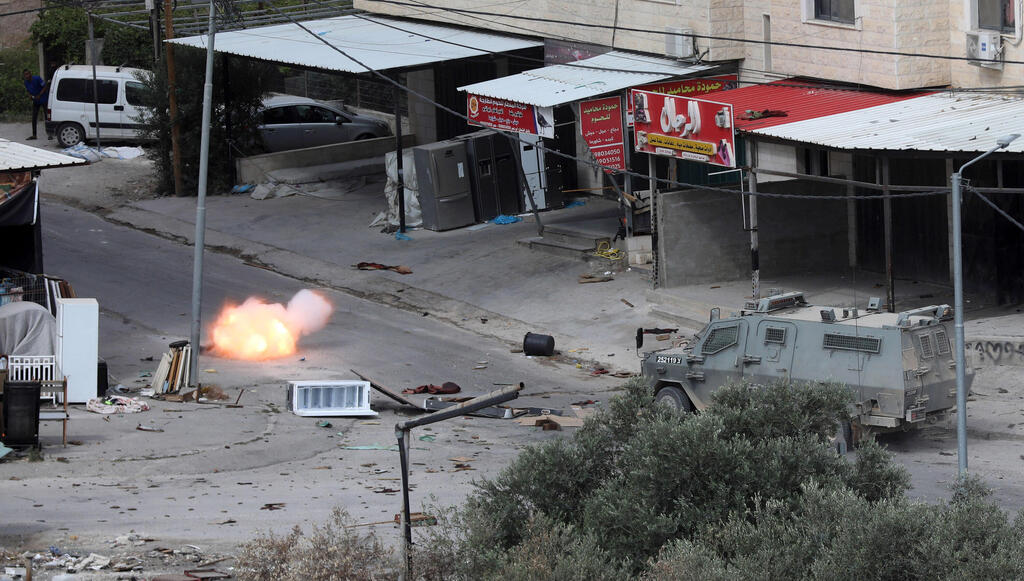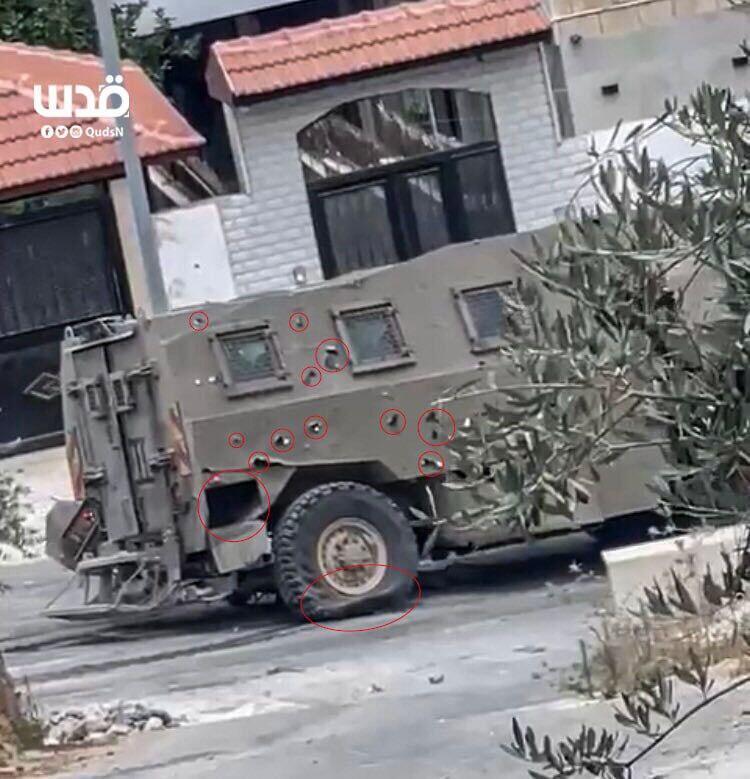Getting your Trinity Audio player ready...
Inevitably, the terrorists in the Jenin area, particularly within the Jenin refugee camp, have devised effective tactics and strategies to counter the IDF's raids and to impede counterterrorism operations. On Monday, they achieved this objective by detonating an explosive device that targeted an IDF "Panther" personnel carrier, transporting a team of Border Police and IDF special forces.
This was not a planned ambush but rather the use of one of the explosive devices that the terrorists had planted over the roads used by forces, over the past few months, particularly during raids on Jenin, its refugee camp, and nearby Wadi Brokin.
The device was set off as troops were leaving the area after they succeeded in carrying out an arrest raid. after the explosion, light arms fire was directed at the vehicle from the outskirts of the camp.
The incident reveals that there has been no intelligence breach as to operational planning but rather the local terror cells have been meticulously studying the routes used by the IDF to enter and leave the area, over the past year. Similar IEDs were found near Nablus as well.
Since the latter part of last year, Palestinian terrorists affiliated with Islamic Jihad and Hamas have been strategically planting explosive devices along the anticipated routes of IDF forces.
The placement of explosive charges primarily aims to inflict harm on the departing forces once they have accomplished their mission in the area. This phenomenon is notably absent in other regions of the West Bank, where the presence and activities of the Palestinian Authority's security mechanisms and forces render a significant portion of the IDF's countermeasures redundant.
In contrast, the Jenin region continues to pose challenges as the PA's security forces have been unwilling or unable to take on the local militants leaving the IDF to gather intelligence and launch operations.
A senior IDF officer recently described the situation in the Jenin area as an ongoing and persistent challenge, stating, "Operation Breakwater that began on March 22 has turned into a Breakwater situation' that we have been dealing with for over a year."
Both Israel's security forces and Palestinian militants have developed and refined their combat methods to counteract each other. Last September, it became evident that the Palestinians had devised effective defense strategies against the IDF, Shin Bet, and border police's "deep penetration" operations.
Video: explosive charge hits IDF vehicle
They identified the routes used by Israeli troops to exit the area as vulnerable points and strategically planted explosive charges there. Initially, the charges consisted of improvised explosives with limited weight and power. However, in recent months, elite units have encountered larger charges weighing over 20 kilograms, which are primarily activated remotely, often using cell phones.
The IDF has acknowledged the significance of this phenomenon. In response, the military took measures to protect the undercarriages of the jeeps and other operational vehicles utilized by special forces during deep operations in the Jenin refugee camp, the city of Jenin, and the surrounding areas, as was reported by the Kan Broadcasting Network.
Explosive charges are not a new phenomenon. The IDF has encountered them before, notably during Operation Guardian of the Walls in 2001. I personally witnessed this when I joined the forces entering the refugee camps in Tulkarm and Balata in Nablus. The IDF also encountered more advanced and lethal charges in Lebanon, such as "slingshot charges" designed to penetrate armored vehicles and cause fatalities among their occupants.
The explosives utilized by Hamas and Islamic Jihad in Jenin are not as technologically advanced or as lethal as those employed by Hezbollah in Lebanon. The charges in the north West Bank consist of standard explosives and are positioned not only on the roadside but also in areas where digging is possible, even in the middle of dirt roads.
While they may not possess the same sophistication and lethality as those in Lebanon, the widespread deployment of these relatively rudimentary explosives by Palestinian terrorists constrains the operational flexibility of the IDF, Shin Bet, and border police, as illustrated by the events of Monday morning.
Regrettably, since the "Panther" is a heavy vehicle, hours passed before it could be towed out of the area after sustaining damage to its wheels. Tragically, the forces came under gunfire from the outskirts of the Jenin refugee camp. As a result, several smaller vehicles and personnel en route to assist on the scene were also targeted, leading to casualties among their ranks.
The process of burying explosives on traffic lanes is indeed a challenging operation that requires careful execution. The IDF's intelligence-gathering efforts are aimed at identifying and marking such locations in advance, particularly during nighttime operations. It is important to note that the selection of alternate routes that have not yet been targeted with explosives is also considered. However, the effectiveness of these measures can vary, and there may be circumstances that hinder their success.
Given the increasing use of explosives by terrorists, it is evident that the IDF needs to adapt its operational methods and employ tools that can effectively clear exit routes, thereby minimizing the risk to forces. It is expected that the sophistication and effectiveness of the explosives employed by Palestinian militants may continue to evolve, necessitating continuous adaptation and vigilance on the part of the IDF. and that the roads leading to settlements could also be subjected to such explosive devices.
The IDF must develop and implement proactive intelligence-gathering methods and preventive measures on the roads in general, with particular emphasis on the areas surrounding the refugee camp and the city of Jenin.
While there is talk of a large-scale operation to foil the activity of the terrorists in the Jenin area, a complete occupation of the city and its surrounding may not be necessary thanks to the Shin Bet and the IDF's excellent intelligence capabilities, which enable them to effectively suppress terrorism and thwart terrorist attacks through targeted operations.






